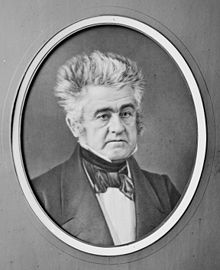William C. Bouck
William C. Bouck | |
|---|---|
 | |
| 13th Governor of New York | |
| In office January 1, 1843 – December 31, 1844 | |
| Lieutenant | Daniel S. Dickinson |
| Preceded by | William H. Seward |
| Succeeded by | Silas Wright |
| Personal details | |
| Born | January 7, 1786 Schoharie District, Albany County, New York |
| Died | April 19, 1859 (aged 73) Fulton, Schoharie County, New York |
| Political party | Democratic |
| Spouse | Catherine Lawyer |
William Christian Bouck (January 7, 1786 – April 19, 1859) was an American politician from New York. He was the 13th Governor of New York from 1843 to 1844.
Life

He was the son of Christian Bouck (1753–1836) and Margaret (Borst) Bouck (1762–1806). He married Catherine Lawyer (1787–1865), and their children were James Madison Bouck, Joseph William Bouck (b. Oct. 27, 1809), Christian Bouck (b. May 14, 1818), Gabriel Bouck, Charles Bouck (b. Sept. 9, 1829), Catherine Bouck (b. July 11, 1820; married Erskine Danforth), Caroline Bouck (married Dr. Volney Danforth), and Anna Bouck (b. Dec. 29, 1814; married Lyman Sanford).
He was Sheriff of Schoharie County from 1812 to 1813. He was a member from Schoharie County of the New York State Assembly from 1814 to 1816 and in 1818. He was a member of the New York State Senate from 1820 to 1822. From 1821 to 1840, he was a member of the Erie Canal Commission.
He was known as "white horse" Bouck, in the days when the Erie Canal was being built. Bouck was responsible for carrying the pay for the workers at the western end of the Erie Canal project. He carried the full saddlebags of money regularly to the workers, alone, riding a white horse, and never once was molested or robbed.
In November 1840, Bouck ran for Governor of New York on the Democratic ticket with Daniel S. Dickinson, but they were defeated by the Whig incumbents William H. Seward and Luther Bradish. In November 1842, Bouck and Dickinson ran and this time were elected, defeating the Whig candidates Bradish and Gabriel Furman.
He was buried in Middleburgh, New York.
Congressman Joseph Bouck was his brother. His son Gabriel Bouck was the Attorney General of Wisconsin.
The town of Bouckville, in central New York state, is named after him. Bouck Hall at SUNY Cobleskill College in Cobleskill, New York, is also named after him.
Sources
- [1] Bio
- [2] Gabriel Bouck Bio - Oshkosh Public Museum
- William C. Bouck: New York's Farmer Governor by Edward A. Hagan, Mark Sullivan and Lester Hendrix (Heritage Books, 2007, ISBN 0-7884-3836-0, ISBN 978-0-7884-3836-3)
- The New York Civil List compiled by Franklin Benjamin Hough (pages 31, 42, 124, 138, 188, 190f, 194, 260 and 407; Weed, Parsons and Co., 1858)

